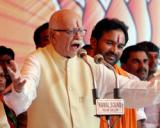
New Delhi, September 12: A delegation of Bharatiya Janata Party (BJP) leaders met President Pranab Mukherjee Wednesday and asked him to intervene and check the government's repeated attacks on the Comptroller and Auditor General (CAG).
"We met the president and said it is important for you to intervene and advise government that it is not proper to attack the CAG," BJP leader L.K. Advani told reporters after the meeting.
"He said he would look into the matter and take appropriate action," he said. "Our fight against corruption will continue, but the way a constitutional body is being attacked, we are afraid constitutional authorities are being made weak," he said.
Sushma Swaraj, Arun Jaitley and Murli Manohar Joshi were amongst those who accompanied Advani to the meeting. CAG, in its recent report, has claimed a presumptive loss of Rs.1.86 lakh crore ($38 billion) due to allocation of coal blocks instead of auctioning them. The prime minister was in charge of the coal ministry for a major part between 2004 and 2009.
Prime Minister Manmohan Singh, in a statement, called CAG's findings "flawed on multiple counts" and said the findings were "clearly disputable".






Comments
Add new comment